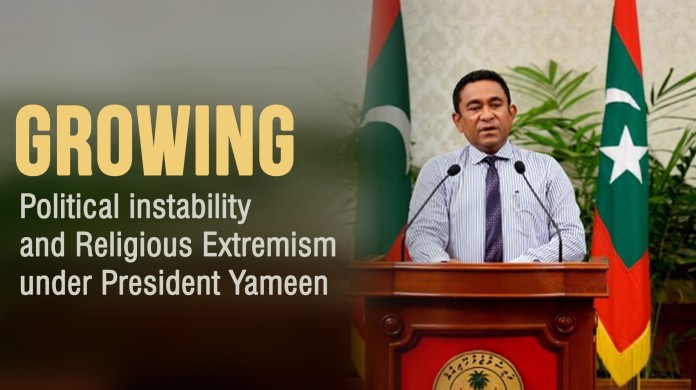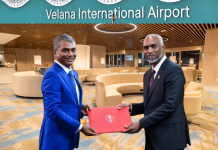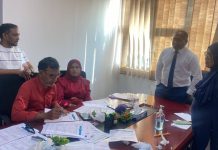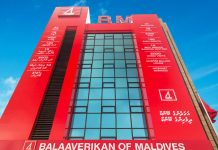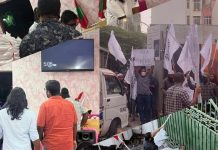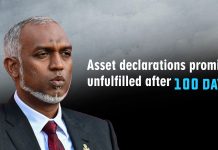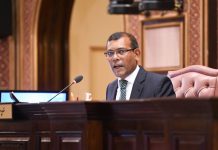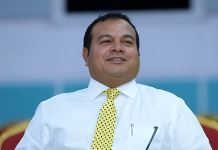President Abdullah Yameen, ever since he came to power in November 2013, has been responsible for pushing the country towards political instability and religious extremism. He has been indulging in activities geared at undermining state institutions with aim to consolidate his grip over the country. This Endeavour has led him to crush political opposition using not only strong-arm tactics but also manipulating independent state institutions, particularly Judiciary, Election Commission and Police. His recent attempt to thwart No Confidence Motion against the Speaker of the Parliament has caused profound political uncertainty derailing the Parliamentary political process. Nearly a dozen of Members of Parliament are on the verge of being disqualified. If it really happens, Parliament, the supreme democratic institution of the country, would witness a situation that would disgrace its dignity for personal gain to retain power. President Yameen never resorted to seek Supreme Court’s ruling on disqualification of MPs when opposition parties’ MPs were crossing the floor to join PPM. But the reverse movement from PPM to join the ranks of the United Opposition due to PPM MPs feeling suffocated made Yameen alarmed and he used the Judiciary to get himself equipped with the verdict to shoot down the No Confidence Motion.
In a bid to usurp control over the key institutions, President Yameen has compromised their integrity and autonomy. The country as a result has become more vulnerable to both authoritarianism and Islamic radicalism. Few entities professing hard line Sunni Islamic identity with emphasis on Salafism and Wahabism have been encouraged to exploit the prevailing situation to their advantage to inspire more people to join their ranks. Political equilibrium in Maldives has become increasingly delicate over the last two years with Yameen Government having jailed, exiled or persistently harassed through arbitrary arrests and police questioning several senior United Opposition (UO) leaders. With PY remaining defiant to suppress opposition forces, political turmoil is likely to further intensify.
Simultaneously, President Yameen has also been pushing the Country towards Islamic conservatism by forging closer ties with Saudi Arabia.  His tenure has seen a spurt in overall Saudi investment from infrastructure to large-scale mosque building activities with the country joining even the Saudi-led Islamic Military Alliance in December 2015. Wahabism under Saudi influence has grown in the country through high level religious interactions with Saudi Arabia. This has impacted the religious orientation of the populace, which was otherwise more liberal in its outlook and akin to democratic values. Saudi Government has also provided educational funds. Grant of US$ one hundred thousand has been given to Islamic University and there are plans to set up Arabic language Centre in Male. Arabic text books have also been distributed in Maldivian schools and Arabic instructors are now teaching in Maldives. There has been an increase in the quota of Saudi scholarships from 150 to 300 for Maldivian Youth. The growing Saudi-Maldivian linkages has resulted in Maldivians moving slowly away from liberal to conservative Islam, which is also visible in the changing dress codes for women, increasing frequency with which men sport beards and in the name changes of Mosques. There has also been an increase in ISIS influence in the Country. Around 200 Maldivians have joined and are fighting with ISIS, the highest per capita of population.
His tenure has seen a spurt in overall Saudi investment from infrastructure to large-scale mosque building activities with the country joining even the Saudi-led Islamic Military Alliance in December 2015. Wahabism under Saudi influence has grown in the country through high level religious interactions with Saudi Arabia. This has impacted the religious orientation of the populace, which was otherwise more liberal in its outlook and akin to democratic values. Saudi Government has also provided educational funds. Grant of US$ one hundred thousand has been given to Islamic University and there are plans to set up Arabic language Centre in Male. Arabic text books have also been distributed in Maldivian schools and Arabic instructors are now teaching in Maldives. There has been an increase in the quota of Saudi scholarships from 150 to 300 for Maldivian Youth. The growing Saudi-Maldivian linkages has resulted in Maldivians moving slowly away from liberal to conservative Islam, which is also visible in the changing dress codes for women, increasing frequency with which men sport beards and in the name changes of Mosques. There has also been an increase in ISIS influence in the Country. Around 200 Maldivians have joined and are fighting with ISIS, the highest per capita of population.
Overall situation in Maldives continues to deteriorate under President Yameen. Such development along with increasing radicalisation may impact long-term strategic and security interests of all stakeholders in the Indian Ocean Region. If the ongoing process is allowed to continue further, Maldives would reach a stage where from making the reverse journey towards democracy would become almost impossible. Doomsday signs are clearly visible on political horizon of Maldives and the time has come for the people to decide whether they would allow the dictator to push the country to abyss. While the opposition politicians have been making their bid to dislodge the dictator to initiate the reform process, its also the responsibility of common people and functionaries of the state to extend helping hand to strengthen the process.
This article has been submitted to Maldives uprising by one of our readers. If you want your article to be featured on our website then please contact us on . your Identity will be kept anonymous.

